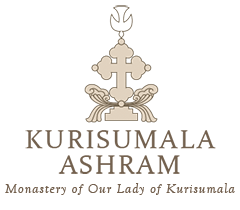Fields of Activity
Kurisumala Ashram is not a clerical community. The principal activity of the Community of Kurisumala is living the monastic charism, as already explained in Spiritual Objectives. Its temporal needs are met by the dairy farm which makes it self-supporting. Many families have settled near the Ashram, some of them on land donated by the community. Almost a hundred local families are supported by the Ashram by accepting milk from them at a good price, supplying medicines to the under-privileged and offering guidance. The farm is a source of jobs and financial help for many others. A medium-sized vegetable garden and a small bakery managed by the brothers provide vegetables and bread for the community’s consumption.
The Benedictine – Cistercian tradition lays great emphasis on hospitality, ‘receiving each visitor as Christ Himself.’ In the Indian tradition, too, reception of guests has been given a prominent place. No wonder, then, that Kurisumala Ashram, where both these traditions merge, is well known for the warm welcome it extends to people from every cross-section of society. There are buildings for male and female guests and hermitages for those who prefer more solitude. Those who come for a stay are given the opportunity to share in the prayer services and life of the community, to the extent allowed by the rules of enclosure. They are expected to give a helping hand ‘Ashram seva’ by participating in household chores, vegetable-cutting and the like. Every aid and help for deeper prayer is made available, including priestly ministry, spiritual guidance. Guests can avail themselves of the library facilities, opening the eyes of their mind to the Written Word, or go for a quiet stroll through the lush surroundings, inclining the ear of their heart to the Word revealed in nature. The church, open round the clock, is a place for silent prayer and reflection where they can ‘re-charge their batteries’ and contemplate their Creator in the cave of their hearts. The guest-book at the Ashram bears words of gratitude and and praise for this ‘Kurisumala experience’ whereby many have experience ‘El-Shaddai’, the God of the mountain.
Another important ministry is the publication and distribution of religious classics, Bibles and other books. Pride of place goes to the four-volume set, ‘Prayer with the Harp of the Spirit’, translated from Syriac by Francis Acharya. The publication of a Malayalam translation of the gem of Eastern Christian spirituality, the ‘Philokalia’, was a major event. It was an inter-religious and inter-denominational effort, and is now into its third edition. Another book of note is a translation of the ‘Ladder of Divine Ascent’, again a classic of the Eastern tradition. These and other books are available for sale at the Ashram book-stall.
A visitor to the Ashram may be surprised by this apparent ‘busy’ness of the monks. Nevertheless, like the tranquil ‘eye’ in the middle of a cyclone, there lies, at the core of these activities, something that transcends the mundane realities of life. As a matter of fact, they give expression to the ashramites’ heart-felt desire and prayer that the Ashram becomes a spiritual leaven in the Church, a beacon of hope for the heart-broken, a haven for the children of God—in short, a prefiguration of His Kingdom on earth.
